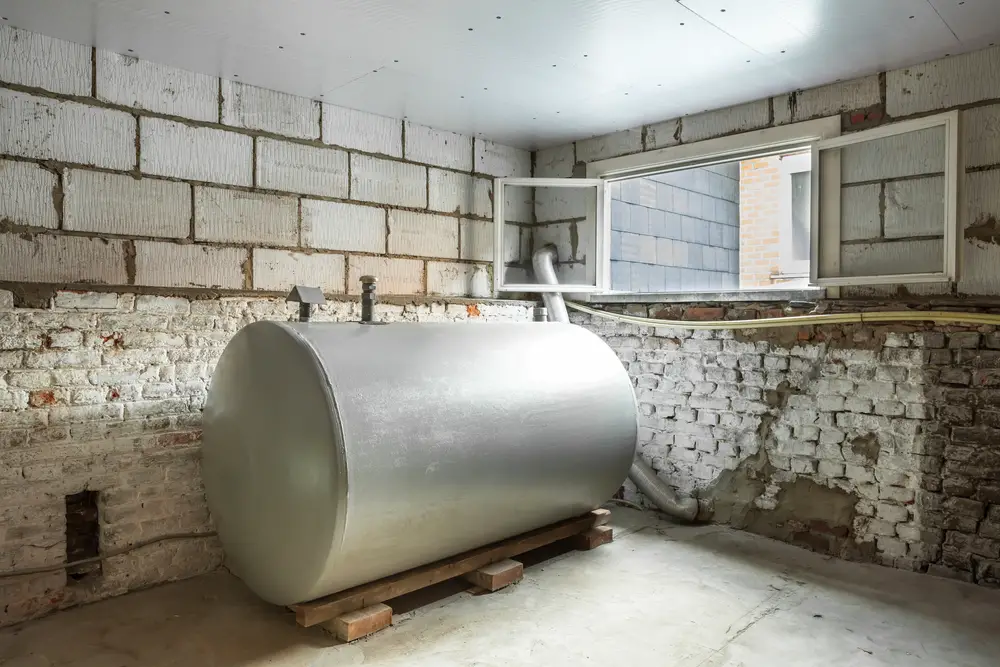Heating oil is a clean, safe, and abundant energy source that has become 95 percent cleaner than in the past, constantly improving to be more environmentally and financially responsible for home heating, with efficiency depending on both the oil quality and the boiler used.
One gallon of heating oil has 125,000 BTUs of energy. It burns at a temperature that is 300 degrees hotter than that of natural gas. During winter, the average price of home heating oil in the United States was $4.54 a gallon, while it was around 87 pence per liter in the United Kingdom.
Curious about the cost and efficiency of heating oil? Read on to find out more!

The heating efficiency of oil
Because oil burns significantly hotter than natural gas, using oil heat for your home heating system might be more efficient. Heating oil burns at a temperature 300 degrees higher than natural gas. This efficiency not only means you get more bang for your money, but it also means you buy less oil. According to recent research, modern, energy-efficient oil heating systems may save homes up to 50 gallons of fuel each year. Updating your heating oil equipment to a more energy-efficient system pays for itself quickly, increases the value of your property, and delivers more efficient domestic heating than gas. An oil-fueled water heater recovers hot water twice as quickly as a gas water heater and three times as quickly as an electric water heater.
British thermal unit (BTU) is the most often used unit of heat measurement. BTUs specifically measure the amount of energy required to elevate one pound of water one degree Fahrenheit at sea level. This measurement is used to determine energy consumption, energy effectiveness, and heating system size. Simply said, the higher the BTU rating, the greater the power and heat production. According to an online resource, one gallon of oil has an energy content of 125,000 BTU, while one gallon of natural gas has an energy content of 20,000 BTU. When you pick oil heating over natural gas, you can get more bang for your buck and keep your home warmer.

Heating oil furnaces
Heating oil furnaces are difficult to beat for convenience or performance – they can be installed in any neighborhood (because they do not require a pipeline, as natural gas does), you will never have to worry about your fuel exploding, and you will always know they will withstand the harshest winter Mother Nature can throw at us. You’ll also have peace of mind knowing that your boiler will last a long time if properly maintained – often 15-20 years or more.
Yet, how efficient are oil-fired furnaces?
The efficiency of Heating oil furnaces: AFUE and HSPF
Boiler efficiency: AFUE
Any discussion of boiler efficiency usually begins with the term AFUE or Annual Fuel Utilization Efficiency. The AFUE value indicates how much of the fuel consumed by your boiler or boiler is directed towards creating heat for your living area (vs. how much energy is wasted along the way). In an 84 AFUE unit, for example, 84 percent of the fuel burned by the machine is used to heat your home; the remaining 16 percent is lost somewhere along the line (usually up the chimney).
Most new oil furnaces have AFUE ratings ranging from 84 percent (the federally mandated minimum) to 90 percent. But, if your boiler is old and poorly maintained, your AFUE could fall into the 60s or even 50s, which is why upgrading your older heating equipment generally pays for itself rather quickly.
HSPF (Heating Seasonal Performance Factor)
HSPF (Heating Seasonal Performance Factor) is used to calculate the energy efficiency of heat pumps. The Heating Seasonal Performance Factor (HSPF) is a heat pump heating efficiency rating. The higher the rating, the better the heat pump. When compared to a less efficient heat pump, a more efficient heat pump will use less energy and save more energy throughout the life of the system.
In general, you should search for heat pumps with HSPF ratings of 8 to 10. The ENERGY STAR® label is given to heat pumps that have at least an 8.2 HSPF rating.
Current technological advancements also indicate that new oil furnaces can be significantly more efficient. If your boiler is more than 15 years old, Energy Star suggests replacing it. According to Energy.gov, a 20-year-old boiler may have an efficiency rating of 78% or less, whereas a new one may have a rating of 95%.
Heating oil prices in the US: Average home heating oil prices for the winter of 2022-2023
This winter, the average price of residential heating oil in the United States is $4.54 per gallon. But, it is considerably more costly in certain locations.
By the beginning of November 2022, the average price of heating oil in New York State was $6.02 per gallon, while heating oil costs in Ohio were also rapidly approaching $6 per gallon (6, 7). Heating oil prices have nearly doubled in the previous two years if not more than doubled in certain locations.
Heating oil prices in the UK: Average home heating oil prices for the winter of 2022-2023
As of January 2023, the average price of home heating oil in the UK was approximately 87 pence per liter. This is a year-on-year increase of 37%. The price peaked at 111 pence per liter in June 2022 and gradually lowered to approximately 89 pence per liter in August. Prices have been gradually falling since October 2022.
Overall, the price of home heating oil per liter is still much higher in 2022 compared with 2021. For example, the price of oil in August 2022 was 82% higher than it was in August 2021.
When is the best time to buy heating oil?
Summer months are often the cheapest for purchasing heating oil, thus June, July, and August. As we saw in 2022, however, this is not always the case. Because these are the coldest months, demand for central heating oil is normally highest from October to March. This increase in demand frequently places a strain on supply, causing heating oil prices to rise.
Prices tend to decline in the summer when demand is normally at its lowest. Hence, while it may seem paradoxical to purchase winter fuel during the hottest months, it might result in the best savings.
When should you buy home heating oil?
The most crucial factor to consider when placing your next heating oil order is the time of delivery. Avoiding last-minute orders increases your chances of obtaining inexpensive home heating oil. Monitor the amount of your home heating oil and schedule your next delivery with plenty of time to spare.
Keep an eye on heating oil costs since they change throughout the year, and we wouldn’t advocate depending just on seasonality.
If you have more capital available to you, its best to switch to Air or Ground source heat pumps as they offer little operational costs.
Concluding remarks
Heating oil burns at a greater temperature than natural gas. An oil-powered water heater recovers hot water twice as fast as a gas water heater and three times faster than an electric water heater. During the winter, the average price of heating oil in the United States was $4.54 a gallon, while in the United Kingdom, it was around 87 pence per liter. Generally, the price of home heating oil per liter in 2022 remains much higher than in 2021. If you want to continue using heating oil to heat your house on a budget, one of the greatest methods to do so is through whole-home weatherization.
